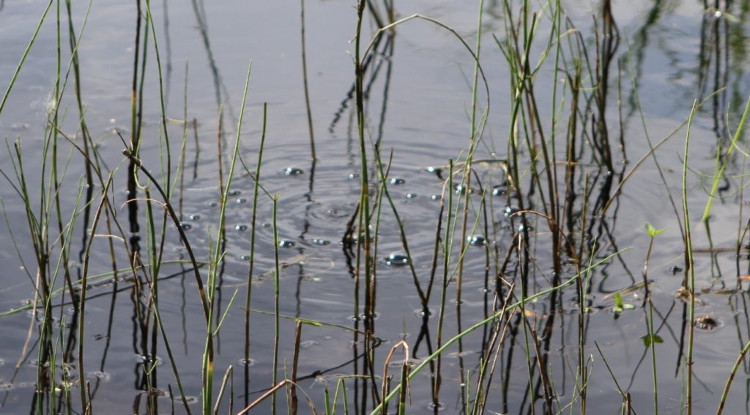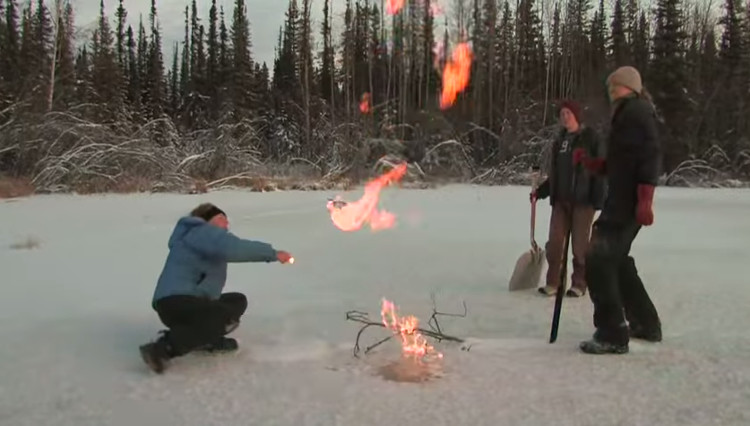The lake is bubbling, burning in the Arctic
NASA is using satellite imagery to study abnormal foaming in lakes in Alaska, USA, resulting from global climate change.
According to the Motherboard, methane bubbling lake in the north of the Arctic is one of the most bizarre phenomena caused by climate change. Some areas here have so much methane emissions that scientists can burn fire on the lake surface.

Bubbling phenomenon occurs in lakes in the Arctic.(Photo: NASA).
These lakes appear after thousands of years of permafrost have disintegrated under the influence of warming climate. As a result, the surrounding ground collapses, forming water-filled sinkholes , called thermokarst lake .
During the formation of thermokarst lakes, carbon dioxide inside the permafrost is exhausted, then microbial in the bottom of the reservoir, resulting in methane bubbles appearing on the surface of the lake. When the lake freezes back in winter, methane bubbles accumulate under the ice surface like a pressure cooker.
Scientists have been studying this phenomenon for many years, but the US Aerospace Agency (NASA) was the first organization to explore the bubbling lake from space through the Arctic Boreal Vulnerability Experiment (ABoVE) project. NASA's idea is to use satellite imagery of changes in Alaska permafrost to support ground measurements.

The methane gas escaping from the lake surface in Alaska caught fire.(Photo: taken from the clip).
"We are trying to calculate the amount of methane released from lakes," Alaska Prajna Lindgren, a doctoral student at the University of Alaska in Fairbanks, said.
The experiment of measuring the amount of methane by researchers like Lindgren is important. Methane is one of the most powerful and powerful greenhouse gases. The disintegrating permafrost can release a lot of methane into the atmosphere in the coming decades. The phenomenon of methane bubbling not only appears in Alaska but is also discovered in Siberia underground.
Initial estimates indicate that the amount of greenhouse gases emitted from the melted ice could increase the Earth's temperature by 0.5 degrees Celsius by the end of the 21st century.
- Arctic ice lake caught fire mysteriously
- The Arctic is burning, threatening to open the ancient 'ice tomb' full of poisonous gas
- Discover a strange 'boiling' sea in Siberia
- Strangely the phenomenon of
- Effervescent lake in New Zealand
- Arctic lake mysteriously missing
- Melt ice will liberate hundreds of millions of tons of methane gas
- Explaining the phenomenon of foaming sand like boiling water
- Burial whales bloody red bubbles
- Detecting Cupid's lake
- Dive to the bottom of the coldest lake in the winter
- The Arctic was warm
 Is the magnetic North Pole shift dangerous to humanity?
Is the magnetic North Pole shift dangerous to humanity? Washington legalizes the recycling of human bodies into fertilizer
Washington legalizes the recycling of human bodies into fertilizer Lightning stone - the mysterious guest
Lightning stone - the mysterious guest Stunned by the mysterious sunset, strange appearance
Stunned by the mysterious sunset, strange appearance NASA catches biological signs on 1.5 billion year old planet
NASA catches biological signs on 1.5 billion year old planet  Satellite detects 'super pollution' that is warming the planet
Satellite detects 'super pollution' that is warming the planet  Dangerous orange plume covers the planet, UNEP issues urgent report: Action needed now!
Dangerous orange plume covers the planet, UNEP issues urgent report: Action needed now!  Decoding the mystery of the giant 'death hole' in Siberia
Decoding the mystery of the giant 'death hole' in Siberia  NASA robots continuously catch 'unexpected life signals'
NASA robots continuously catch 'unexpected life signals'  NASA found traces of methane gas near a crater on Mars
NASA found traces of methane gas near a crater on Mars 